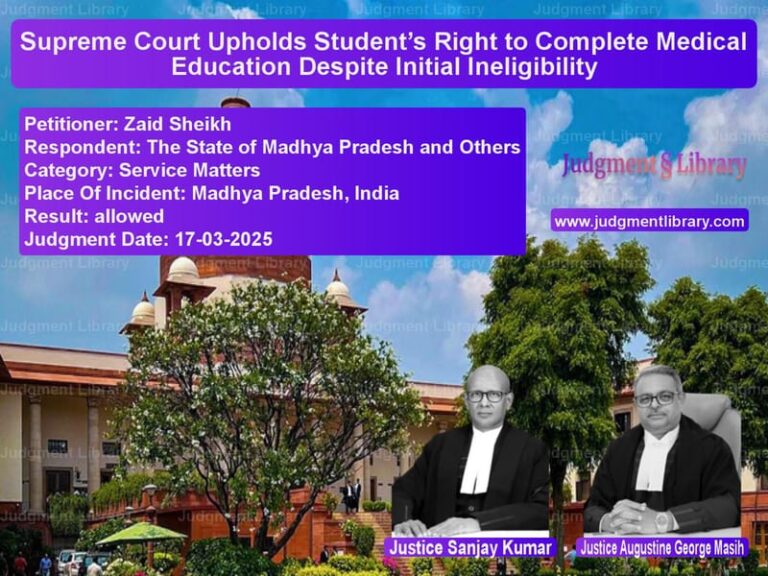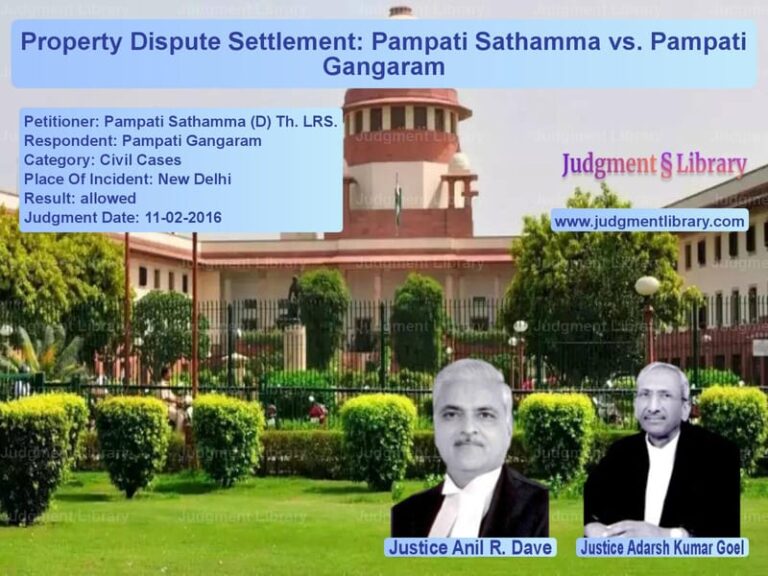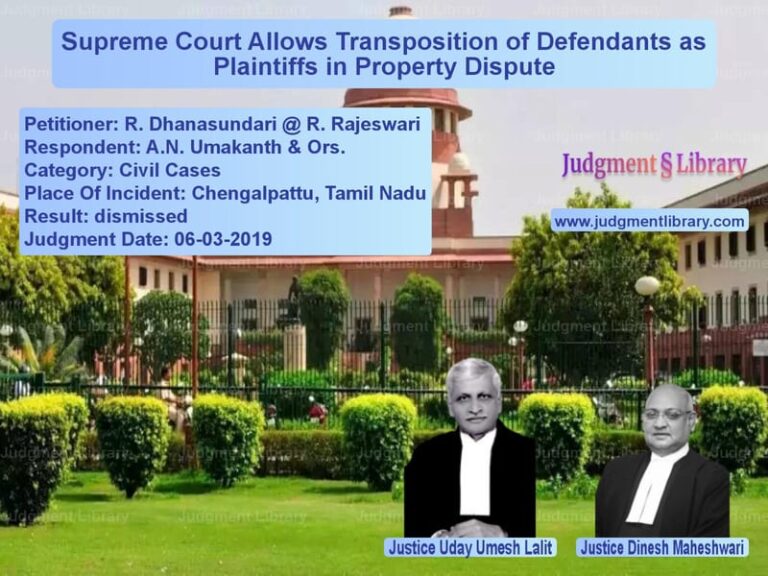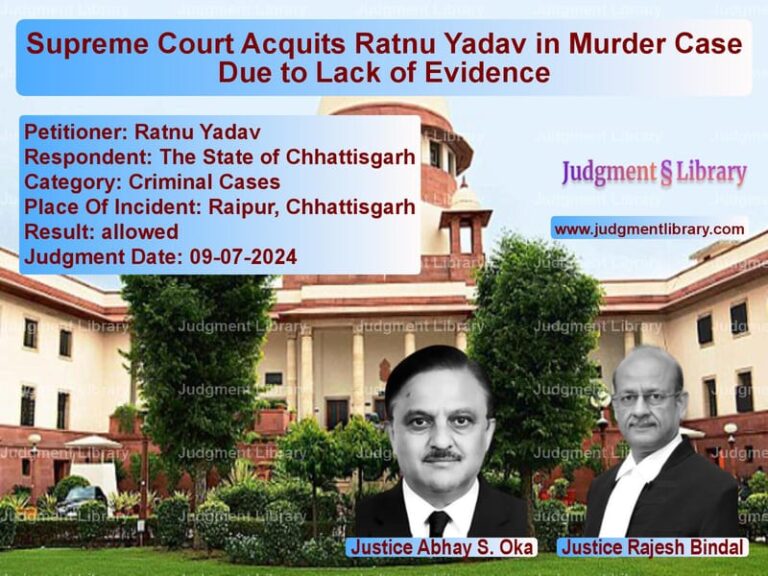Supreme Court Upholds Murder Conviction Based on Dying Declarations
The Supreme Court of India, in Criminal Appeal No. 1012 of 2008, upheld the conviction of the appellant, Raju Devade, for the murder of an 18-year-old girl named Baby. The case was based on the reliability of multiple dying declarations and the application of Section 302 IPC. The Court reaffirmed the principles of admissibility of dying declarations and their role in securing convictions.
Background of the Case
On the evening of March 4, 1989, the victim, Baby, was alone at home in Mehkar, Maharashtra. Her brother returned from a movie to find her engulfed in flames. He immediately sought help, and she was taken to a hospital for treatment. Before her death, the victim gave multiple statements to the police and judicial authorities. The case hinged on the reliability of these statements.
Events Leading to the Incident
The victim was allegedly in a romantic relationship with the accused, Raju Devade. According to the prosecution, the accused had promised to marry the victim but later retracted his commitment. When the victim confronted him, he became enraged, poured kerosene on her, and set her ablaze.
Evidence Presented by the Prosecution
- The victim’s dying declarations, given to the police and a magistrate, clearly implicated the accused.
- Medical records confirmed that the victim suffered 90% burns and succumbed to her injuries within 48 hours.
- The police investigation uncovered that the accused had visited the victim’s house just before the incident.
- Witness statements from neighbors supported the claim that there was an altercation between the victim and the accused before the fire broke out.
Arguments by the Appellant (Accused)
The accused presented the following defenses:
- The conviction was based solely on circumstantial evidence without direct eyewitness testimony.
- The victim’s third dying declaration, recorded by a magistrate, stated that she had suffered burns due to an accidental fire from a kerosene lamp.
- The police failed to examine crucial witnesses, including the superior officer whom the victim had allegedly called before her death.
- The medical report did not match the statements made in the dying declarations.
- The possibility of the victim committing suicide due to personal distress was not considered by the courts.
Arguments by the Respondent (State of Maharashtra)
The prosecution countered these claims by asserting:
- The victim had consistently stated in her first two dying declarations that the accused had set her on fire.
- The third dying declaration was recorded under pressure from the accused’s family.
- The accused misled the police about his whereabouts at the time of the incident.
- The forensic analysis confirmed that kerosene was poured on the victim intentionally, ruling out an accidental fire.
Legal Issues Considered by the Supreme Court
1. Admissibility of Multiple Dying Declarations
The Supreme Court considered whether multiple dying declarations can form the sole basis for conviction. It reiterated:
“If there are multiple dying declarations, the courts must analyze their consistency. A conviction can be based solely on a dying declaration if it is free from doubt and corroborated by other evidence.”
2. Reliability of the Third Dying Declaration
The defense relied on the third dying declaration, where the victim stated that her burns were accidental. The Supreme Court rejected this argument, ruling:
“When the first two declarations are consistent and implicate the accused, a later contradictory declaration, possibly influenced, cannot override the previous ones.”
3. Presumption Under Section 113B of the Evidence Act
The prosecution invoked Section 113B of the Evidence Act, which presumes culpability in unnatural deaths of women within seven years of marriage due to cruelty. The Court noted:
“The victim had no reason to falsely implicate the accused. Given the consistency of her statements, the defense’s argument of coercion is not credible.”
4. Application of Section 302 IPC
The Court ruled that the offense clearly fell under Section 302 IPC, which prescribes life imprisonment or death for murder:
“The act of pouring kerosene and setting a person ablaze exhibits a clear intention to cause death. The trial court rightly convicted the accused under Section 302 IPC.”
Supreme Court’s Final Decision
- The appeal was dismissed, and the conviction under Section 302 IPC was upheld.
- The accused was sentenced to life imprisonment.
- The court rejected any possibility of reducing the sentence.
Implications of the Judgment
1. Strengthening the Legal Value of Dying Declarations
The ruling reaffirms that a dying declaration, if found credible, can serve as the sole basis for conviction. Courts must analyze inconsistencies carefully.
2. Protection of Victims in Domestic Violence Cases
The judgment highlights the importance of ensuring justice for victims of domestic violence and dowry-related crimes.
3. Establishing Judicial Clarity on Multiple Dying Declarations
The ruling clarifies that in cases with multiple dying declarations, the first recorded statements are usually the most credible, unless strong evidence suggests otherwise.
Conclusion
The Supreme Court’s decision in Raju Devade v. State of Maharashtra sets a precedent for handling cases where dying declarations are key evidence. By upholding the conviction, the Court reinforced the principles of criminal jurisprudence, ensuring justice for victims of heinous crimes.
Don’t miss out on the full details! Download the complete judgment in PDF format below and gain valuable insights instantly!
Download Judgment: Raju Devade vs State of Maharashtra Supreme Court of India Judgment Dated 29-06-2016-1741872356163.pdf
Direct Downlaod Judgment: Direct downlaod this Judgment
See all petitions in Murder Cases
See all petitions in Judgment by Abhay Manohar Sapre
See all petitions in Judgment by Ashok Bhushan
See all petitions in dismissed
See all petitions in supreme court of India judgments June 2016
See all petitions in 2016 judgments
See all posts in Criminal Cases Category
See all allowed petitions in Criminal Cases Category
See all Dismissed petitions in Criminal Cases Category
See all partially allowed petitions in Criminal Cases Category







